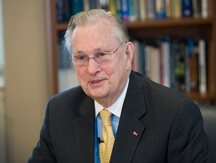New director discusses goals of Global Policy Research Institute
Purdue’s Global Policy Research Institute has opened its doors to the world.
From its new home in the Schowe House on Northwestern Avenue, the think tank for global transformation will increase the visibility of Purdue’s research findings and enhance the impact of the University's discoveries for the common good.
“Purdue can use its strengths in research and international programs to translate issues from public policy into research and to enlighten and provide new options that play an important role in reaching political consensus,” says Arden Bement, director of the institute. Bement is former head of the School of Nuclear Engineering and has served as director of the National Science Foundation since 2004. He led the National Institute of Standards and Technology from 2001 to 2004.
Purdue has long been known for research with global impact. It is recognized for an international campus culture. It is celebrated for top-ranked graduate programs. Bement says the Global Policy Research Institute will draw on these strengths to form strategic partnerships from the local to international level. It will help Purdue do what it does best: allow the power of its science to connect with society so that everyone can make better-informed decisions about today’s grand challenges.
The new institute will stand apart from the nearly 1,500 other policy institutes around the country, Bement says. Few other policy institutes can make the vital connection between science and society from a solid foundation in the STEM (science, technology, engineering and mathematics) and agriculture disciplines. Even fewer can do so on a global scale. Such connections are vital at a time when the rapid advances in science, engineering and technology have the power to change the world instantly.
“With the advance in communication and information technology, the world is shrinking and global issues are proliferating. These issues are complex enough that they are beyond any one university or nation to address,” Bement says.
Among Purdue’s policy-informing research strengths are water research; cybersecurity; information technology as applied to health care; pandemics and infectious disease; and prediction of and response to disruptive events. Purdue geologists and civil engineers have been on the ground in Haiti following the January earthquake studying both the seismic event and the infrastructural damage. They are there at the invitation of the Haitian government, which will take the research into consideration as the country rebuilds.
“Our role is to provide opportunities for debate by identifying new concepts in science that can have bearing on key policy issues,” Bement says, adding that the institute will not play an advocacy role.
Bement says his experience as director of the world’s most noted science agencies has given him the equivalent of a PhD in foreign relations and public policy. It also has connected him with powerful thought leaders around the world, whose expertise he intends to draw on as he establishes the new thought center. He views such global relationships as integral to its success.
Although global in name, the institute will focus on policy at all levels, from local government to international agencies. Its programs will offer opportunities for students to engage in internships and pursue a master’s degree in public policy and public administration. It will fuel cross-disciplinary and cross-national research. It will inform through workshops and symposia, and bring world experts to campus as visiting scholars.
At base, Purdue’s Global Policy Research Institute will strengthen connections between science and society and, in so, doing prepare all members of the University community to be responsible, engaged citizens.

